The year 2023 at the LMU Newsroom
27 Dec 2023
What particularly attracted the attention of lmu.de readers in recent months.
27 Dec 2023
What particularly attracted the attention of lmu.de readers in recent months.

Antonia von Ellerts moved to Canada to study abroad.
Many students go abroad for a time during their studies. Every year, LMU sees over 1,200 such “outgoings”: students who move to another country for one or two semesters. They can choose from more than 550 partner universities worldwide, with the LMUexchange and Erasmus+ programs facilitating exchanges. Irrespective of LMU’s partnerships, however, students can, on their own initiative, also apply to attend any university in the world.
“A stay abroad is an experience for life. The students get to know the host country but also come into contact with fellow students from many different countries, sharing in their cultural diversity. This can contribute to openness, tolerance and a sense of belonging, of solidarity – all things we need now more than ever,” says Claudia Wernthaler, who supervises “outgoings” under the Erasmus+ program at LMU’s International Office.
For the article, see Out into the big, wide world
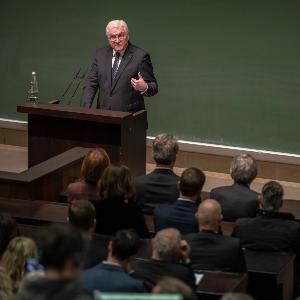
German President Frank-Walter Steinmeier delivered his memorial lecture in the Audimax auditorium in LMU’s main building. | © LMU
On 6 February 2023, German President Frank-Walter Steinmeier delivered a lecture at LMU recalling the legacy of all members of the resistance who fought against the National Socialists’ reign of terror.
In his speech, Steinmeier praised the resistance engaged in by the members of the White Rose: “Sophie and Hans Scholl. Christoph Probst. Kurt Huber. Alexander Schmorell. Willi Graf. Hans Leipelt. All of them paid for their courage with their life.”
He also reminded his listeners of those kindred spirits of the Munich-based group who spread leaflets throughout the country in many and varied ways, emphasizing the importance of shared remembrance in light of current societal challenges: “We remember not for the sake of remembering or to set the members of the White Rose on a pedestal. They were heroes, without a doubt. Yet we also look back in the knowledge that responsibility for our past never expires. Our past must serve as a warning for the present and the future.”

spends a lot of time on field trips. Right now, she is mainly in Iraq, on the territory of what was once the Assyrian Empire. | © Stephan Höck / LMU
Karen Radner’s claim to “do research wherever I find myself” in an interview published on lmu.de appealed to many readers. Radner is an expert on the Assyrian Empire, which was once the cultural center of the world. She spends a lot of time on field trips. Her work has won her the Leibniz Prize, Germany’s most prestigious research award.
Karen Radner holds the Humboldt Chair for the Ancient History of the Near and Middle East at LMU. In the interview and in the video, she talked about her career trajectory and about what we can learn from the lost culture of the Assyrian Empire and how it was organized.
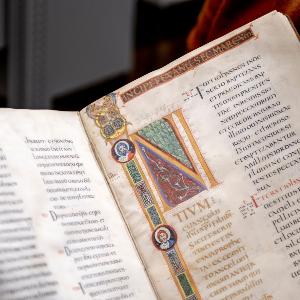
The Evangeliary of Charlemagne | © LMU
The University Library in Munich houses important works that date back many centuries. Some of them are so valuable they are kept in a vault. For a Newsroom article, Dr. Sven Kuttner, Head of Special Collections and Deputy Director of the University Library, presented a selection of special works that are unique worldwide.
One of these is Charlemagne’s Evangeliary or Gospel Book – the oldest book in the library’s stock. “It is almost unthinkable what would be lost to the world if anything happened to this book,” Kuttner says.
“It’s almost unthinkable what would be lost from the world if anything happened to this book”
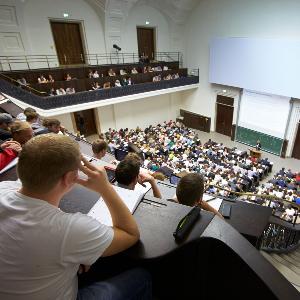
© Jan Greune (LMU)
The Fund for the Promotion of Good Teaching is one way in which LMU supports innovative teaching concepts from its faculties by providing extra money from an internal budget. The initiative has – understandably – been very well received.
Readers of LMU Newsroom articles likewise showed a keen interest in the innovative concepts used at LMU. One of them involved Sanskrit tutorial videos at the Institute of Indology and Tibetology; another featured video corrections at the Faculty of Law.
LMU has endowed the fund with money from its internal budget — a total of one million euros, to be distributed in two phases. The first phase runs until the end of the 2024 summer semester, after which a second round for innovative teaching projects will begin. The first round has already seen 39 applications from 12 faculties received by LMU’s University Teaching Committee, 31 of which were successful. The disciplines they span include the humanities, computer science, human and veterinary medicine and economics.
Nurturing teaching excellence at LMU: For a culture of good teaching

Janik Ludwig plays the viola, is involved in the student council and likes doing sports. | © LMU / LCproductions
In June, LMU students lifted the lid on their hobbies and shared what they do to strike a healthy study-life balance. Whether you like to go climbing or hiking, whether you play an instrument or enjoy cooking, even time-consuming hobbies can help you take your mind off your studies.
Mirjam Eisermann from the Student Advisory Service hears this kind of feedback again and again. She even organizes workshops on the topic: “Every car has to fill up with fuel again after a certain distance,” she says. “Activities such as hobbies, sports and socializing help us recharge our batteries and stay in good shape physically and mentally. Only then can we avoid stress and master the challenges of everyday work and study.”
Newsroom articles on LMU students regularly generate considerable interest among our readers. Our interview on the subject of students who are the first in their family to target higher education was no exception to this rule.
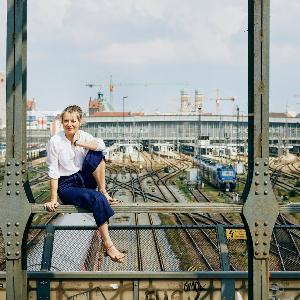
is convinced: “Railway stations are fascinating places for travelers and flaneurs alike.” | © Florian Generotzky / LMU
Germanist Margit Dirscherl studies the role of railway stations in literature. In an interview with research magazine Einsichten (Insights), the literary scholar talked about such topics as railway stations as sites of longing and the serious background to the story of Paddington Bear.
Why do literary works have such a fascination for railway stations? “All walks of life come together in railway stations, and stories begin or end there. And because there are different classes of passenger travel to this day, they are also mirrors of the respective society, also with respect to political power struggles and warfare,” Dirscherl says.
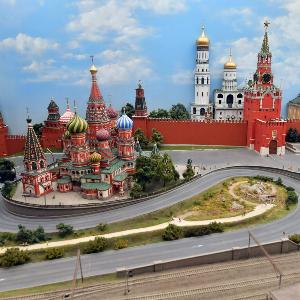
The museum diorama “The Tsar Layout” in Moscow | © IMAGO / Russian Look / Komsomolskaya / Pravda
Researchers at LMU often give the media interviews about current events. In the Newsroom, too, their views are always very much in demand.
In August, Professor Martin Schulze Wessel spoke about Russia’s war against Ukraine on the occasion of the latter’s Independence Day. The historian explained the importance of this national holiday for Ukraine, but also discussed Putin’s historic role models. The Russian leader’s policies “are based to some extent on non-rational political calculus, following historical scripts,” he argued. “[Putin] is guided by the role played by the great tsars in Russian history, such as Peter the Great. While he instrumentalizes history to his own ends, he’s also the prisoner of a skewed historical discourse from the late 19th century.”
“Putin is trapped in imperial paradigms that hark back to the past”
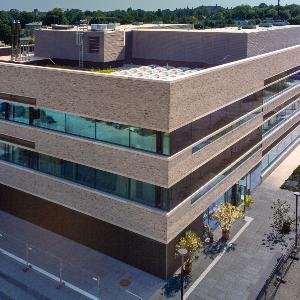
One of the centerpieces of the expanding research center beyond Munich’s northern municipal boundary: The new building of the Institute of Infection Medicine and Zoonoses. | © LMU
In September, LMU opened a state-of-the-art building for the Institute of Infection Medicine and Zoonoses at the Faculty of Veterinary Medicine on its Oberschleissheim campus. The facility’s aim is to foster better research into zoonoses and develop methods to prevent them from spreading. Zoonoses are diseases that can jump from animals to humans.
A total of 2,885 square meters of usable floor space includes research labs, seminar rooms, offices and an animal house – all subject to very strict security standards and providing ideal conditions for leading-edge research. The new facility is one of the centerpieces of the expanding research center beyond Munich’s northern boundary. The range of topics it covers perfectly complements the research strategy pursued by the Faculty of Veterinary Medicine on the new campus.
Preventing future pandemics: LMU’s new microbiology building
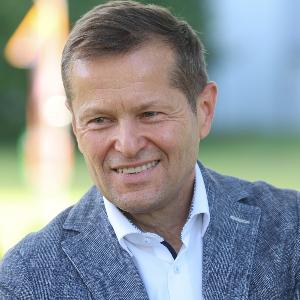
Professor Ferenc Krausz ranks as one of the founders of the discipline known as attosecond physics. | © picture alliance/dpa | Karl-Josef Hildenbrand
Together with two other researchers, Professor Ferenc Krausz, Chair of Experimental Physics/Laser Physics at LMU, has been awarded this year’s Nobel Prize in Physics for his work on attosecond physics. Krausz, who is also Director of the Max Planck Institute of Quantum Optics in Garching, received the award in conjunction with Anne L’Huillier of Lund University in Sweden and Pierre Agostini of Ohio State University in the United States. The three researchers were recognized for experimental methods of creating attosecond pulses of light that make it possible to investigate the behavior of electrons in atoms and molecules.
“I can scarcely believe this is reality and not just a dream,” Krausz said after the announcement. “I feel so overwhelmed. It’s truly humbling to receive such an award. But it’s also a wonderful feeling to be rewarded in this way, especially after some of the setbacks along the way.” It goes to show, he continued, that it’s worth holding fast and not losing faith in one’s research, particularly when one has the good fortune to work at such excellent institutions as LMU and the Max Planck Institute, which offer ideal conditions for research.
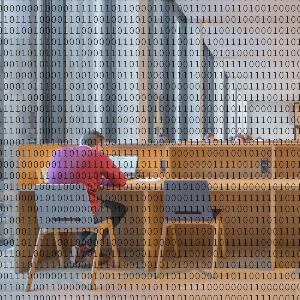
“With AI, every student has their personal research assistant at their fingertips,” says Professor Frauke Kreuter. “One that is super-efficient, but that also makes mistakes and is liable to make things up.” Chair of Statistics and Data Science in Social Sciences and the Humanities, Kreuter is one of the growing number of teachers at LMU who are imparting the methods, applications and risks of AI to their students – in subjects ranging from Assyriology to business studies, from mathematics to educational theory.
University magazine MUM published an article entitled “How artificial intelligence is changing teaching and learning” that discusses the role AI plays in lecturing at LMU.
The next event in the FocusLMU lecture series will likewise tackle the subject of AI. An outline of the numerous research topics around artificial intelligence is provided in the dossier “Highlights of interdisciplinary AI research”.
How artificial intelligence is changing teaching and learning
Highlights of interdisciplinary AI research
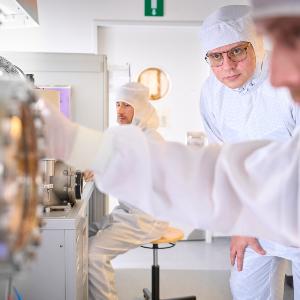
Dmitri Efetov is Professor of Experimental Solid State Physics at LMU. | © Jan Greune
Dmitri Efetov, Professor of Experimental Solid State Physics, has won the most important research award in Germany for his work on graphene. Graphene is an allotrope of carbon with very special qualities. In the nanomaterial, which consists of just a single layer of atoms, electrons become massless. If you twist two layers of graphene to a certain ‘magic’ angle in relation to each other, you get a variety of exotic quantum phases with new physical phenomena such as superconducting, magnetic and isolating states, the properties of which Dmitri Efetov studies. His research has yielded fundamental new insights into various quantum effects.
For his pioneering work on the manufacture of highly homogeneous ‘magic-angle’ graphene, Dmitri Efetov has been awarded a 2024 Leibniz Prize by the German Research Foundation (DFG).